ATLANTA—Every year at its Annual Meeting, the ACR recognizes its members’ outstanding contributions to the field of rheumatology through an awards program. The ACR is proud to announce 20 award recipients for 2019, honored for their accomplishments as clinicians, instructors or researchers who have helped advance rheumatology, for their commitment to inspire others to enter the field or for advocating for the needs of rheumatology patients and the professionals who care for them. (Click here for Part 1 of this series, which focused on the ARP awards and ACR Masters in the November issue.)
Presidential Gold Medal
 John P. Atkinson, MD, MACR, Samuel B. Grant Professor of Medicine at the Washington University School of Medicine, St. Louis, received the ACR’s highest award—the Presidential Gold Medal—for his outstanding achievements in clinical medicine, research, education or administration during his distinguished career.
John P. Atkinson, MD, MACR, Samuel B. Grant Professor of Medicine at the Washington University School of Medicine, St. Louis, received the ACR’s highest award—the Presidential Gold Medal—for his outstanding achievements in clinical medicine, research, education or administration during his distinguished career.
Dr. Atkinson, who is also professor of molecular microbiology and director of the RVCL (retinal vasculopathy with cerebral leukoencephalopathy) Research Center at Washington University School of Medicine, says his most important basic science investigations focused on the complement system. Initially, these studies centered on C2 and C4, and more recently, on characterization of complement receptors and regulators. In 1985, his laboratory identified and then cloned a novel inhibitor—membrane cofactor protein (MCP) or CD46. His clinical interest has primarily focused on identifying and further defining rare inflammatory diseases.
Dr. Atkinson completed his medical degree at the University of Kansas School of Medicine, Kansas City, Kan., in 1969 and then an internal medicine residency in 1971 at Massachusetts General Hospital, Boston. From 1971–74, he served in the U.S. Public Health Service, working for Michael Frank, MD, lab director at the National Institute of Allergy and Infectious Diseases, Bethesda, Md. From 1974–76, he was a fellow in allergy, clinical immunology and rheumatology at Washington University School of Medicine. In 1976, he was named a Howard Hughes Medical Institute Investigator and chief of the university’s Division of Rheumatology, which he directed from 1976–92 and again from 2007–17. From 1992–97, he was the Adolphus Busch Professor and chaired the university’s Department of Medicine.
Over the past 50 years, Dr. Atkinson has published 300 original reports, 200 reviews, editorials, book chapters and case reports, and participated in more than 50 named lectures and professorships. He has served in many leadership positions. For the National Institutes of Health (NIH), he chaired the General Medicine A Study Section, the Warren G. Magnuson Clinical Center Board of Scientific Counselors and the National Human Genome Research Institute’s Board of Scientific Counselors.
He has particularly liked working with volunteers in local and national rheumatology, arthritis and lupus foundations.
Dr. Atkinson received the Paul Klemperer Medal from the New York Academy of Medicine in 1990, the Lee C. Howley Sr. Prize from the National Arthritis Foundation in 1991 and the Distinguished Faculty Award at Founders’ Day from Washington University School of Medicine in 1993. He was elected to the National Academy of Medicine in 1996, was presented with the Distinguished Investigator Award by the ACR in 1998 and the American Association of Immunology’s Steinman Award for Human Immunology Research in 2012. He enjoys teaching immunology and rheumatology to students, house officers and fellows. Medical students at Washington University School of Medicine have recognized him with the Distinguished Service Teaching Award 16 times and Teacher of the Year three times.
“I’m very grateful for this award [the ACR Presidential Gold Medal], which reflects over four decades of ongoing studies in immunology as a physician scientist and serving as a teacher focused on rheumatic diseases,” says Dr. Atkinson. “Rheumatology is a great field to be working in—and also humbling. I have been fortunate to be surrounded by wonderful students, house officers, fellows, clinical and research colleagues, and mentors whom I cannot thank enough. Modern genetics is teaching us a lot, and I want to continue to be part of this revolution.”
Distinguished Service Award
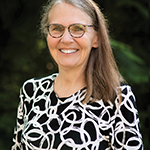 The ACR Distinguished Service Award was presented to Polly Ferguson, MD, the Marjorie K. Lamb professor of Pediatrics at the University of Iowa, Iowa City, for her outstanding and sustained service to the ACR.
The ACR Distinguished Service Award was presented to Polly Ferguson, MD, the Marjorie K. Lamb professor of Pediatrics at the University of Iowa, Iowa City, for her outstanding and sustained service to the ACR.
Dr. Ferguson strongly believes in the ACR’s mission for a multitude of reasons. She says the organization provides those in academic medicine with opportunities to advance their careers, advocates for patients and providers at the government level to ensure needed care is delivered and leads clinicians, researchers and practitioners in rheumatology.
She has served on at least eight different ACR committees, including the Pediatric Rheumatology Section Executive Committee, the Committee on Research, the Abstract Review Committee, the Abstract Oversight Committee, a research subcommittee of the Government Affairs Committee, the Committee on Nominations and Appointments, and the JIA Treatment Guideline Development Group. She also chaired the Pediatric Rheumatology Special Committee.
Dr. Ferguson is now a member of the NIH’s National Institute of Allergy and Infectious Diseases Board of Scientific Counselors, the Arthritis Foundation’s Medical and Scientific Advisory Committee and the American Board of Pediatrics’ Rheumatology sub-board.
She received her medical degree from the Roy J. and Lucille A. Carver College of Medicine at the University of Iowa in 1990. During the next decade, she completed her training at the University of Virginia School of Medicine, Charlottesville, which included her pediatric residency, pediatric rheumatology and immunology fellowship and a postdoctoral research fellowship.
In 2000, she served for two years as an assistant professor of pediatrics at the University of Alabama, Birmingham. In 2002, she returned to the University of Iowa, where she now serves as the director of pediatric rheumatology, allergy and immunology at the Stead Family Department of Pediatrics.
Her current NIH-funded research focuses on uncovering the genetic and immunologic basis of autoinflammatory diseases, particularly those that affect the bone, and understanding the role of inflammation in neurologic disease. She has identified several genes that cause sterile osteomyelitis and has translated findings into effective treatment. Her work has been cited in medical journals nearly 5,000 times.
Meanwhile, she has mentored many undergraduate, graduate, postdoctoral fellows and junior faculty from the University of Iowa and other schools. She also serves as the training director of the university’s Department of Pediatrics K–12 Child Health Research Career Development Award program.
“What means the most to me about this award is that my peers thought to nominate me, when there are so many other outstanding volunteers, and that they value what I’ve done,” says Dr. Ferguson. “It’s a very humbling experience.”
Distinguished Clinician Scholar Award
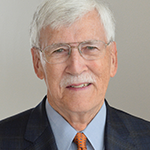 J. Timothy Harrington, MD, retired professor of medicine at the University of Wisconsin School of Medicine and Public Health, Madison, received the Distinguished Clinician Scholar Award for his outstanding contributions to clinical medicine, clinical scholarship and education.
J. Timothy Harrington, MD, retired professor of medicine at the University of Wisconsin School of Medicine and Public Health, Madison, received the Distinguished Clinician Scholar Award for his outstanding contributions to clinical medicine, clinical scholarship and education.
Dr. Harrington’s career has focused on using quality improvement methodologies to optimize the processes of caring for patients with rheumatic diseases. Over the years, he has extensively collaborated with national and global colleagues, resulting in the publication of numerous papers in medical journals and two co-authored books about delivery of care innovations.
The first book—co-authored with Eric Newman, MD—was published in 2012: Great Health Care: Making It Happen, which introduces best practices for improving the care of chronic diseases. Earlier this year, Great Health Care Value: Chronic Diseases, Practice Teams, and Population Management, co-authored with Andrew Johnson, MS, MBA, was published. This book includes outcomes from the Rheumatoid Arthritis Practice Performance (RAPP) Project, a nationwide, clinical, quality-improvement initiative that was led by Dr. Harrington and has since grown to include 170 rheumatologists.
Meanwhile, Dr. Harrington launched a consulting firm that bears his name. He works with medical specialty practices, health systems and industry, and informally advises colleagues.
Dr. Harrington graduated from medical school at the University of Wisconsin, Madison, in 1965; finished his internal medicine training at Massachusetts General Hospital two years later; completed research and clinical associateships at the NIH’s National Cancer Institute in 1969; continued his internal medicine residency training at Parkland Memorial Hospital and the University of Texas Southwestern Medical Center, both in Dallas, in 1970; and completed a rheumatology fellowship at the University of Texas Southwestern in 1972. He spent the next six years in academic research, education and administration at the University of Texas Health Science Center, San Antonio, and then practiced rheumatology and taught practice improvement between 1976 and 2012, before retiring.
Dr. Harrington joined the ACR in 1970 and served on several committees and task forces, including the Committee on Rheumatologic Care, the Osteoporosis Taskforce and the Abstract Selection Committee. He previously was honored by the ACR with the Paulding Phelps award in 1993 and Master designation in 2005.
“I’ve had the satisfaction of helping practice teams improve their patient care and productivity,” says Dr. Harrington. “This third ACR award is the trifecta that acknowledges my efforts and those of my like-minded colleagues.”
Distinguished Clinical Investigator Award
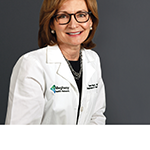 Susan Manzi, MD, MPH, professor of medicine, chair of the Medicine Institute and director of the Lupus Center of Excellence at Allegheny Health Network in Pittsburgh, received the Distinguished Clinical Investigator Award for her outstanding contributions to the rheumatology.
Susan Manzi, MD, MPH, professor of medicine, chair of the Medicine Institute and director of the Lupus Center of Excellence at Allegheny Health Network in Pittsburgh, received the Distinguished Clinical Investigator Award for her outstanding contributions to the rheumatology.
Dr. Manzi has focused her career on caring for patients and conducting clinical and translational research in systemic lupus erythematosus (SLE).
“I am honored and grateful to be the recipient of this award,” she says. “The ACR has played an important role at every stage of my career.”
Dr. Manzi graduated from the University of Pittsburgh School of Medicine in 1985, where she was elected to the Alpha Omega Alpha Honor Medical Society. She completed her medical internship and residency at Duke University Medical Center, Durham, N.C., and her rheumatology fellowship at the University of Pittsburgh Medical Center. She earned a Master in Public Health from the Graduate School of Public Health at the University of Pittsburgh.
Dr. Manzi is recognized internationally as a pioneer in the investigation of premature cardiovascular disease in SLE and discovery of biomarkers for lupus diagnosis, monitoring and stratification. She has published more than 200 scientific reports and book chapters, and invented the cell-bound complement activation products (CB-CAPs) technology platform, for which she holds more than 20 patents.
Since she joined the ACR in the late 1980s, she has served on the Abstract Review Committee, the Committee on Research, the Professional Meetings Subcommittee and the Educational Products Committee, and served as the clinical chair of the Annual Meeting Planning Committee.
She has served on advisory boards for the U.S. Food & Drug Administration and pharmaceutical and biotech companies, chaired or served on NIH study sections and data safety monitoring boards, and currently chairs the Lupus Foundation of America board of directors and is vice chair of the Systemic Lupus International Collaborating Clinics.
Among the awards she has received are the Pitt Innovator Award in 2005 and 2006 for her discovery of CB-CAPs, the 2017 Richard E. Deitrick Humanity in Medicine Award from the Allegheny County Medical Society and the 2019 Catholic Youth Association John E. McGrady Award for dedication to community service.
Looking ahead, Dr. Manzi says she hopes to “transform the experience of those suffering from autoimmune conditions by building teams that focus on a holistic approach to healthcare and access to research.”
Distinguished Basic Investigator Award
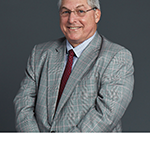 Bruce Cronstein, MD, MACR, Paul R. Esserman Professor of Medicine and director of the Clinical and Translational Science Institute and Division of Translational Medicine at the New York University School of Medicine, received the Distinguished Basic Investigator Award for making outstanding contributions to rheumatology.
Bruce Cronstein, MD, MACR, Paul R. Esserman Professor of Medicine and director of the Clinical and Translational Science Institute and Division of Translational Medicine at the New York University School of Medicine, received the Distinguished Basic Investigator Award for making outstanding contributions to rheumatology.
Dr. Cronstein obtained his medical degree from the University of Cincinnati College of Medicine in 1976. Four years later, he completed his residency in internal medicine at the University of Cincinnati and Lenox Hill Hospital, New York. By 1983, he had completed his rheumatology fellowship at the New York University School of Medicine in the Division of Rheumatology. In 2006, he founded the school’s Master of Science in Clinical Investigation program and three years later, its Clinical and Translational Science Institute.
For nearly 40 years, Dr. Cronstein has been immersed in laboratory investigation and experimental work. His first discovery: Adenosine, a molecule generated by adenosine triphosphate metabolism, which inhibits inflammation. He subsequently learned the anti-inflammatory effects of methotrexate are primarily mediated by an increase in adenosine released from cells at inflamed sites and that adenosine is also involved in the pathologic mechanism leading to fatty liver and liver fibrosis. In the mid-1990s, his lab demonstrated that adenosine plays an important part in wound healing and in the subsequent fibrosis and scarring that occurs in extensive wounds.
Dr. Cronstein and his colleagues have also made important observations on the anti-inflammatory mechanism of action of such drugs as aspirin, corticosteroids, colchicine and sulfasalazine. They discovered that adenosine is critical to maintain bone homeostasis, can be used to promote bone regeneration and maintains chondrocyte homeostasis. Dr. Cronstein is now developing a novel adenosine-based therapy for treatment and reversal of osteoarthritis.
In 2018, he co-founded Regenosine, a startup that uses his intellectual property to create medicines for osteoarthritis. He chairs the company’s scientific advisory board.
Dr. Cronstein joined the ACR in 1980 and considers the organization his professional home. Over the years, he has played important roles in the association. He was a member of the Committee on Ethics and Conflict of Interest, chaired the Committee on Research for two terms and served as an ACR board member between 2014 and 2017. He was also named an ACR Master in 2016.
Dr. Cronstein received the 2013 Lee C. Howley Sr. Prize for Research from the Arthritis Foundation.
“Although my research sometimes branched out into other areas, it hasn’t strayed too far from my original interests in arthritis and rheumatology,” Dr. Cronstein says. “Being recognized by the ACR for my work is really the capstone on my career.”
Paulding Phelps Award
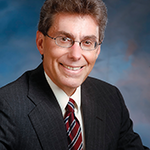 Alfred E. Denio, MD, rheumatology fellowship program director at Geisinger Health System, Danville, Pa., received the Paulding Phelps Award for his outstanding service to patients, community and the practice of medicine.
Alfred E. Denio, MD, rheumatology fellowship program director at Geisinger Health System, Danville, Pa., received the Paulding Phelps Award for his outstanding service to patients, community and the practice of medicine.
Dr. Denio is passionate about physician education. He has personally recruited more than 100 community faculty physicians for the Eastern Virginia Medical School, Norfolk, and helped first- and second-year medical students receive their first clinical experience in medicine.
“This award is the highlight of my rheumatology career,” says Dr. Denio. “It’s a prestigious honor to be recognized by colleagues and peers; it’s an overwhelming experience in my professional life.”
In 1981, Dr. Denio earned his medical degree from the University of Pittsburgh. He completed his internal medicine residency in 1984 at Geisinger Health System and, after spending the next year as chief medical resident, finished his rheumatology fellowship there in 1987. That same year, he joined the Center for Arthritis and Rheumatic Diseases, Norfolk, and also served as volunteer director of rheumatology at Eastern Virginia Medical School. In this new role, he helped develop the M1-M2 longitudinal mentorship program and organized rheumatology teaching from 2000–10.
He also founded a free rheumatology clinic at the Chesapeake Health Department, Va., where he volunteered to treat rheumatic disease patients without health insurance.
He returned to Geisinger Health System in 2010 as an adjunct assistant clinical professor of internal medicine at the Lewis Katz School of Medicine at Temple University, Philadelphia. Two years later, he assumed the rheumatology fellowship program director position at Geisinger Health System, where he remains today.
Since joining the ACR in 1987, he has served on the board and acted as a liaison to several committees. He has chaired the Affiliate Society Council, leading the effort to form the Insurance Subcommittee of the ACR’s Committee on Rheumatologic Care and the EMR Subcommittee.
His efforts over the years have not gone unnoticed. The Eastern Virginia Medical School presented him with the Distinguished Service Award in the Department of Internal Medicine in 1999 and the Dean’s Community Faculty Achievement Award in 2002. He received the Outstanding Community Service Award from the city of Chesapeake in 2005 and the Arthritis Foundation’s Medical Excellence Award in 2010.
“There are a number of individuals who deserve credit for fostering my career,” says Dr. Denio, pointing to ACR Past President Joseph Flood, MD, for example. “My focus in subsequent years is to make the rheumatology fellowship at Geisinger a premier fellowship known, among other things, for improving the quality of care that rheumatologists everywhere provide.”
Henry Kunkel Young Investigator Award
The Henry Kunkel Young Investigator Award is awarded to a physician scientist, age 45 or younger by Oct. 1 of the year in which they are nominated, who has made outstanding and promising independent contributions to basic or clinical research in the field of rheumatology. This year’s recipients are Katherine P. Liao, MD, MPH, and Amr H. Sawalha, MD.
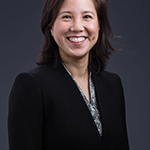 Dr. Liao is an associate professor of medicine and assistant professor of biomedical informatics at Harvard Medical School, Boston. She is also the director of VERITY Bioinformatics Core in the Division of Rheumatology, Immunology and Allergy Research at Brigham and Women’s Hospital, Boston, and leads a bioinformatics research group at the Veterans Affairs Healthcare Center, Boston.
Dr. Liao is an associate professor of medicine and assistant professor of biomedical informatics at Harvard Medical School, Boston. She is also the director of VERITY Bioinformatics Core in the Division of Rheumatology, Immunology and Allergy Research at Brigham and Women’s Hospital, Boston, and leads a bioinformatics research group at the Veterans Affairs Healthcare Center, Boston.
“I feel very fortunate to receive an award for work that I love doing, that my colleagues find impactful and moves the field forward,” says Dr. Liao.
Dr. Liao graduated from SUNY Downstate Health Sciences Center, Brooklyn, N.Y., in 2004. Three years later, she completed her internal medicine residency at Massachusetts General Hospital, and her rheumatology fellowship at Brigham and Women’s Hospital in 2010. That same year, she also earned a Master of Public Health at the Harvard T.H. Chan School of Public Health and joined the faculty at Harvard Medical School and Brigham and Women’s Hospital.
While focused on the role of inflammation and cardiovascular disease in rheumatoid arthritis (RA), Dr. Liao’s work has enhanced rheumatologists’ understanding of the complex relationship between inflammation, lipids and cardiovascular risk in RA. Current studies are taking a closer look at the impact of inflammation on the small vessels in the heart, its association with higher mortality and preventive strategies.
Her work has also focused on bringing novel approaches from biomedical informatics, such as machine learning and natural language processing, to rheumatology clinical research. At both Brigham and Women’s Hospital and the Veterans Affairs Healthcare Center, Dr. Liao and her team develop and apply approaches to accurately identify patients with rheumatic conditions using electronic health record data, increasing opportunities for discovery research with expanded access to clinical data.
Linking electronic health record data with genomic data at the Veterans Affairs Healthcare Center in the Million Veteran Program affords new challenges for analyses, along with opportunities for research. Her team recently used the genomic and clinical data in the program to screen for potential effects of an anti-inflammatory RA therapy across 1,800 other conditions.
Since joining the ACR in 2007, Dr. Liao has served on the ACR and European League Against Rheumatism RA Classification Criteria Committee, co-chaired the Health Services Abstract Review Committee for the ACR/ARP Annual Meeting, and now chairs the ACR’s Research and Publications Subcommittee of the Committee on Registries and Health Information Technology.
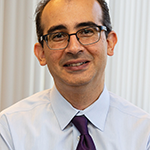 Dr. Sawalha is a professor of medicine and pediatrics, chief of the Division of Rheumatology in the Department of Pediatrics and director of the Lupus Center of Excellence at the University of Pittsburgh School of Medicine.
Dr. Sawalha is a professor of medicine and pediatrics, chief of the Division of Rheumatology in the Department of Pediatrics and director of the Lupus Center of Excellence at the University of Pittsburgh School of Medicine.
His work has predominantly focused on lupus, but has expanded to other related immune-mediated diseases, such as vasculitis and scleroderma. His research focuses on elucidating genetic and epigenetic contributions to the pathogenesis of systemic autoimmune and inflammatory diseases. His team applies state-of-the-art genomic, epigenomic and bioinformatics methodologies and subsequent functional studies using both in vitro and in vivo systems to identify and characterize genetic and epigenetic loci and pathways involved in the pathogenesis of immune-mediated diseases.
Dr. Sawalha graduated medical school from the Jordan University of Science and Technology, Irbid, Jordan, in 1998. Five years later, he completed his residency at the University of Oklahoma Health Sciences Center, Oklahoma City, and then his fellowship in rheumatology at the University of Michigan Medical School, Ann Arbor, in 2005.
Between 2005 and 2012, he was on the faculty of the University of Oklahoma Health Sciences Center and the Oklahoma Medical Research Foundation before returning to the University of Michigan Medical School in 2012, where he held multiple positions: professor of internal medicine and Marvin and Betty Danto Research Professor of Connective Tissue Research, director of the rheumatology training grant funded by the NIH and associate director of the NIH-funded University of Michigan Clinical Autoimmunity Center of Excellence.
Earlier this year, he joined the faculty at the University of Pittsburgh School of Medicine, where he is also the Vincent Londino Endowed Chair in Pediatric Rheumatology and director of the Division of Rheumatology at UPMC Children’s Hospital of Pittsburgh. In this new role, he is establishing and leading a new Autoimmune Genomics Research Center.
Over the years, Dr. Sawalha has authored nearly 150 peer-reviewed manuscripts, book chapters and review articles, and 100-plus abstracts. He serves on several boards and committees, including the Medical Scientific Advisory Council of the Lupus Foundation of America and the Vasculitis Foundation Medical and Scientific Advisory Board, and chairs the ACR’s Abstract Oversight Committee. He has also received multiple awards, including the ACR’s Edmund L. Dubois, MD, Memorial Lectureship Award in 2015 for his work in lupus. In 2014, he was named a member of the American Society for Clinical Investigation.
“It is humbling to know that my contribution to the field of rheumatology has been recognized by my colleagues,” says Dr. Sawalha. “This award is special, and just to be among the group of previous award recipients is a big honor.”
Distinguished Fellowship Program Director Award
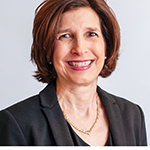 For her outstanding contributions to the mentoring and training of future rheumatologists, Marcy B. Bolster, MD, associate professor of medicine, Harvard Medical School, Massachusetts General Hospital, has received the Distinguished Fellowship Program Director Award.
For her outstanding contributions to the mentoring and training of future rheumatologists, Marcy B. Bolster, MD, associate professor of medicine, Harvard Medical School, Massachusetts General Hospital, has received the Distinguished Fellowship Program Director Award.
“This is a lifetime achievement award for me,” says Dr. Bolster, director of the Rheumatology Fellowship Training Program in the Division of Rheumatology, Allergy and Immunology at Massachusetts General Hospital. “I feel proud and privileged to participate in training rheumatology fellows and to have an influence on their training.”
Dr. Bolster has devoted her career to training rheumatology fellows, internal medicine residents and medical students. She helped train more than 50 rheumatology fellows. She is also active in the Women in Medicine Trainees Council, Department of Medicine Education Council and the Graduate Medical Education Committee at Massachusetts General Hospital. As Harvard Medical School faculty, she participates in undergraduate medical education and has helped redesign the curriculum for first-year students in the immunity, defense and disease block.
Dr. Bolster obtained her medical degree in 1988 from Duke University School of Medicine, Durham, N.C. Three years later, she finished her residency in internal medicine at Eastern Virginia Medical School, Norfolk, Va.
Then she completed her rheumatology fellowship at the Medical University of South Carolina in 1993, where she joined the faculty, served as director of the Rheumatology Fellowship Training Program from 1999–2012 and was appointed director of the Center for Osteoporosis and Bone Health from 2009–12. In 2012, she joined the faculty at Harvard Medical School and started her new role as director of the Rheumatology Fellowship Training Program at Massachusetts General Hospital.
Since 1992, she has made significant contributions to the ACR. She helped develop Rheum2Learn, online internal medicine resident education modules in rheumatology; chaired the Committee on Rheumatology Training and Workforce Issues, contributing to the 2015 Workforce Study; and co-chaired the update of the organization’s Rheumatology Fellowship Core Curriculum. She also contributed to the Core Curriculum Outline for nurse practitioners and physician assistants entering rheumatology practice.
Dr. Bolster has recently held leadership roles with the American Board of Internal Medicine. Besides serving on its Rheumatology Board from 2009–14, she also chaired its Rheumatology Exam Committee from 2014–18 and now chairs the organization’s Rheumatology Specialty Board.
As a recent recipient of a Rheumatology Research Foundation Clinician Scholar Educator Award, she is devoted to the training and assessment of trainees in rheumatology and committed to addressing the gaps in the rheumatology workforce.
“My involvement in fellow education is one of the most rewarding parts of my job and gives me incredible fulfillment and satisfaction,” says Dr. Bolster.
Excellence in Investigative Mentoring Award
 Patricia Katz, PhD, professor of medicine, health policy and urology at the University of California, San Francisco (UCSF), received the Excellence in Investigative Mentoring Award for her contributions to the rheumatology profession through outstanding and ongoing mentoring.
Patricia Katz, PhD, professor of medicine, health policy and urology at the University of California, San Francisco (UCSF), received the Excellence in Investigative Mentoring Award for her contributions to the rheumatology profession through outstanding and ongoing mentoring.
After receiving a master’s degree in psychology in 1974 and a doctorate in educational measurement from the University of South Carolina, Columbia, in 1982. Dr. Katz came to the University of California, San Francisco (UCSF) in the mid-’80s as a staff researcher and joined the faculty in 1993. Based in the Division of Rheumatology, she has worked with investigators across the campus, including those in the divisions of pulmonary and critical care medicine and hospital medicine, the departments of urology and surgery and the Institute for Health Policy Studies.
Dr. Katz, who also serves as vice chair for UCSF’s Institutional Review Board, joined the ACR and the ARP in the early 1990s.
“The ACR is one of the foundations of all of my professional activities,” she says. “It’s given me tremendous opportunities for professional growth and to develop collaborations here at UCSF and elsewhere over the past 30 years.”
Her research has followed two main paths—the measurement of patient-centered outcomes and the impact of lifestyle factors, primarily obesity, physical inactivity and sleep, on clinical and patient-centered outcomes. It has also included a strong emphasis on the study of disparities in health outcomes.
In addition to authoring more than 250 papers, she has received grants from a variety of sources, such as the NIH and Rheumatology Research Foundation.
As co-director of the Rheumatology Division’s mentoring program at UCSF, she has worked with over two dozen postdoctoral students and fellows as a career and research mentor. She has actively mentored a number of junior rheumatology faculty members at the university and other institutions.
Over the years, Dr. Katz has served on the ARP Program Committee and the ACR Subcommittee on Diagnostic, Classification and Response Criteria. She has also served on the Rheumatology Research Foundation’s Scientific Advisory Council and Board of Directors, while regularly reviewing grant applications for the foundation, NIH and international rheumatology funding agencies. Dr. Katz is also a former editor in chief of Arthritis Care & Research and current co-editor in chief of ACR Open Rheumatology.
Over the past 20 years, the ACR and the ARP have honored Dr. Katz for her work. She received the Distinguished Scholar Award in 1997, STAR Award in 2005, Presidential Award in 2003 and 2010 and the Lifetime Achievement Award in 2015.
She says this award is different: “It acknowledges my contribution to the next generation of researchers and educators, helping them follow their own direction,” Dr. Katz says.
Distinguished Fellows
This year, the Distinguished Fellow Award was presented to 10 physicians who are clinical and research fellows in a rheumatology fellowship training program and who have performed meritoriously.
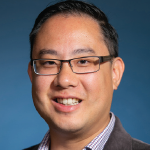 Ever since he was a medical student, Jonathan TL Cheah, MBBS, now an assistant professor of medicine in the Department of Rheumatology at UMass Memorial Health Care and the University of Massachusetts Medical School, Worcester, has been interested in bone. During his rheumatology fellowship at the Hospital for Special Surgery, N.Y., over the past three years, he led the development of a bone health patient registry and served as the fellow for the OMERACT Glucocorticoid Impact Special Interest Group, which involved investigation related to patients’ perspectives on the effects of systemic glucocorticoids.
Ever since he was a medical student, Jonathan TL Cheah, MBBS, now an assistant professor of medicine in the Department of Rheumatology at UMass Memorial Health Care and the University of Massachusetts Medical School, Worcester, has been interested in bone. During his rheumatology fellowship at the Hospital for Special Surgery, N.Y., over the past three years, he led the development of a bone health patient registry and served as the fellow for the OMERACT Glucocorticoid Impact Special Interest Group, which involved investigation related to patients’ perspectives on the effects of systemic glucocorticoids.
This project, to be presented at OMERACT 2020, aims to develop a core domain set of glucocorticoid effects to be measured in clinical trials. His other research investigated the use of magnetic resonance imaging as a modality for the opportunistic screening of poor bone quality, which earned him a 2019 Young Investigator Travel Grant award from the American Society for Bone and Mineral Research.
Dr. Cheah earned his medical degree from University College London in 2010. His medical school research project entailed studying the effects that different chemotherapeutic agents used in the treatment of osteosarcoma have on bone progenitor cells. He did his postgraduate training at Southampton General Hospital in Hampshire, England, where he spent four months as an academic foundation trainee in the University of Southampton’s MRC Lifecourse Epidemiology Unit.
He received a postgraduate certificate in medical education and completed residency training in internal medicine at Montefiore Medical Center, New York. During his residency, he received Program Innovation and Outstanding House Officer in Internal Medicine awards.
In 2016, Dr. Cheah joined the ACR and has served as a fellow-in-training member on the Committee on Corporate Relations, as well as a CARE question writer, most recently contributing to the osteoporosis and metabolic bone diseases and crystal arthritis sections.
“This award recognizes everything achieved up to the current day and credits all the individuals at different institutions who have supported me throughout these projects,” says Dr. Cheah. “The ACR is very welcoming of junior members, encouraging us to serve on committees.”
Currently, Dr. Cheah is working with colleagues to develop the osteoporosis clinical services at UMass Memorial Health Care, which in time, will provide patient access to a multi-disciplinary team, including rheumatologists, physical therapists, dietitians and radiologists, and also drive research projects.
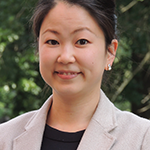 Sarah Chen, MD, MPH, a postdoctoral research fellow in the Division of Pharmacoepidemiology and Pharmacoeconomics at Brigham and Women’s Hospital, attended her first ACR/ARP Annual Meeting in 2012, when she was in medical school.
Sarah Chen, MD, MPH, a postdoctoral research fellow in the Division of Pharmacoepidemiology and Pharmacoeconomics at Brigham and Women’s Hospital, attended her first ACR/ARP Annual Meeting in 2012, when she was in medical school.
“It was very exciting,” she says, adding that she’s impressed by the ACR’s ability to reach out to trainees in rheumatology to take advantage of mentorship opportunities early in their career. “That’s when I knew I was in the right field.”
Dr. Chen, also an associate physician in the Division of Rheumatology, Inflammation and Immunity at Brigham and Women’s Hospital, graduated from the David Geffen School of Medicine at the University of California, Los Angeles, in 2012. She completed her internal medicine residency four years later at Beth Israel Deaconess Medical Center, Boston. Earlier this year, she finished her rheumatology fellowship training at Brigham and Women’s Hospital and also earned a Master of Public Health at the Harvard T.H. Chan School of Public Health.
During her fellowship training, Dr. Chen studied the epidemiology of cardiovascular diseases in SLE under the mentorship of Karen Costenbader, MD, MPH, professor and director of the Lupus Program at Harvard Medical School, and participated in pharmacoepidemiology projects under the mentorship of Seoyoung Kim, MD, associate professor of medicine at Brigham and Women’s Hospital.
Dr. Chen’s projects demonstrated low rates of cardiovascular disease preventive care in patients with SLE and high risk of heart failure in lupus patients compared to patients without lupus. She also studied the risk of infections in abatacept users compared with tumor necrosis factor inhibitors in patients with RA, using propensity score matched analysis. She researched the use of prescription opioid analgesics in patients with rheumatic diseases, finding higher rates among patients with RA, SLE and psoriatic arthritis—and the highest rates in patients with ankylosing spondylitis (AS)—compared with age- and sex-matched controls.
Since then, she has learned methods in epidemiology and biostatistics for regression, survival analysis and propensity scores to design, analyze and publish these studies in respected medical journals.
As part of the ACR’s rheumatology fellows initiative, Dr. Chen helped deliver educational seminars at community clinics throughout 2016 and 2017 to raise awareness of the importance of early detection and referral for patients with SLE. She also contributes articles to the SLE newsletter at Brigham and Women’s Hospital’s Lupus Center to educate SLE patients on cardiovascular disease prevention.
She’s humbled by this award and plans to spend the next several years of her career as a pharmacoepidemiology researcher.
“I want to study the effectiveness and safety of drugs used in patients with rheumatologic diseases,” says Dr. Chen. “The ACR is a great platform for clinical research.”
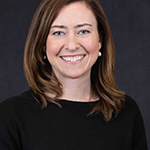 Dana DiRenzo, MD, MHS, finished her fellowship in rheumatology at Johns Hopkins, Baltimore, earlier this year and then joined the university faculty as an instructor of medicine in the Division of Rheumatology at Johns Hopkins University. She is interested in patient wellness and certified in mindfulness and meditation. Currently, she’s studying how mindfulness may improve coping and positively impact symptoms and disease activity related to autoimmune disease.
Dana DiRenzo, MD, MHS, finished her fellowship in rheumatology at Johns Hopkins, Baltimore, earlier this year and then joined the university faculty as an instructor of medicine in the Division of Rheumatology at Johns Hopkins University. She is interested in patient wellness and certified in mindfulness and meditation. Currently, she’s studying how mindfulness may improve coping and positively impact symptoms and disease activity related to autoimmune disease.
As a 2019 Jerome L. Greene Foundation Scholar, funding through this foundation helped support her two studies with active enrollment: an office-based mindfulness program and a smartphone-based mindfulness meditation program.
She is engaged in patient-reported outcomes research in inflammatory arthritis, Sjögren’s syndrome and myositis under the guidance of her primary mentor, Clifton O. Bingham III, MD, professor of medicine and director of the Johns Hopkins Arthritis Center. At the 2019 ACR/ARP Annual Meeting, she had two poster presentations related to healthcare utilization for those with RA and quality of life for those with Sjögren’s syndrome.
“I’m analyzing several cohorts at Johns Hopkins, particularly Sjögren’s syndrome and rheumatoid arthritis,” she says. “I’m looking at their patient-reported outcomes related to quality of life. This also gives insight with regard to whether an intervention like mindfulness may improve outcomes.”
Dr. DiRenzo received her medical degree from the Lewis Katz School of Medicine at Temple University in 2013. Three years later, she completed her residency in internal medicine at the University of Maryland Medical Center, Baltimore. In 2018, she obtained a master’s in health science in clinical investigation from the Johns Hopkins Bloomberg School of Public Health.
Dr. DiRenzo joined the ACR in 2012. Over the past several years, she has held various volunteer positions. From 2017–18, she served on the Scientific Advisory Council for the Rheumatology Research Foundation and presently serves on the Quality of Care Committee.
As an organization, the ACR is an “excellent networking mechanism,” she says, that enables her to meet and work with different collaborators. She describes the ACR as a “great” patient advocate and “terrific” educational resource for her patients who cope with different rheumatic diseases. “To be recognized by such an outstanding organization means a lot to me. I’m taken aback by the recognition of my efforts.”
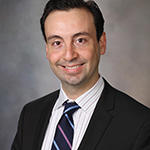 Ali Duarte-Garcia, MD, assistant professor of medicine in the Division of Rheumatology at the Mayo Clinic, Rochester, Minn., completed his fellowship training at the Mayo Clinic earlier this year and is now pursuing a master’s in clinical and translation science at the Mayo Clinic Graduate School of Biomedical Sciences.
Ali Duarte-Garcia, MD, assistant professor of medicine in the Division of Rheumatology at the Mayo Clinic, Rochester, Minn., completed his fellowship training at the Mayo Clinic earlier this year and is now pursuing a master’s in clinical and translation science at the Mayo Clinic Graduate School of Biomedical Sciences.
During Dr. Duarte’s rheumatology fellowship, he received the Rheumatology Research Foundation 2017 Marshall J. Schiff, MD, Memorial Fellow Research Award for his work on antiphospholipid syndrome epidemiology.
Dr. Duarte currently holds multiple positions at the Mayo Clinic: senior associate consultant, co-director of the lupus and antiphospholipid syndrome clinics in the Rheumatology Division and scholar at the Mayo Clinic Robert D. and Patricia E. Kern Center for the Science of Health Care Delivery.
He has had a long-standing clinical and research interest in SLE and antiphospholipid syndrome. His research has shown that cognitive dysfunction in lupus is a non-inflammatory syndrome and that lupus flares have a seasonal variation. He analyzed the predictors of proteinuria in patients with SLE and recently published the first study describing the epidemiology of antiphospholipid syndrome in the general population.
Dr. Duarte received his medical degree in 2010 from the Universidad Autónoma de Chihuahua, Mexico, and then continued his training in the U.S. After completing his residency in internal medicine in 2015 at Tufts Medical Center, Boston, he received the Rheumatology Research Foundation Preceptorship Award.
He vividly remembers attending his first ACR/ARP Annual Meeting while still in medical school in 2009. “The ACR has given me so many opportunities that resulted in me getting this award,” he says. “I was just blown away by that Annual Meeting. I was inspired by the researchers and clinicians who wrote papers that I had previously read.”
Dr. Duarte says he has received many valuable experiences while serving as a member of the ACR’s Committee on Registries and Health Information Technology and Committee on Communications and Marketing. His work has been published in Arthritis and Rheumatology, JAMA Internal Medicine and Annals of Internal Medicine.
Earlier this year, he collaborated with Seeker, an online network that’s part of Discovery Digital Networks, to create a video about lupus. Since May, he says it has been viewed more than 100,000 times.
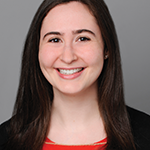 Rebecca Haberman, MD, clinical instructor and postdoctoral research fellow in the Division of Rheumatology at NYU Langone Health, New York, earned her medical degree in 2014 from the New York University School of Medicine. She remained at the school to complete her internal medicine residency in 2017 and rheumatology fellowship earlier this year.
Rebecca Haberman, MD, clinical instructor and postdoctoral research fellow in the Division of Rheumatology at NYU Langone Health, New York, earned her medical degree in 2014 from the New York University School of Medicine. She remained at the school to complete her internal medicine residency in 2017 and rheumatology fellowship earlier this year.
Last year, she was recognized by the school’s internal medicine residents as Rheumatology Fellow of the Year and selected to serve as the chief fellow of rheumatology. In that role, she organized the academic schedule, oversaw junior fellows and worked closely with division leadership on all aspects of the fellowship program. To further her research endeavors, she was awarded the medical school’s T32 research training grant and received the National Psoriasis Foundation Early Career Research Grant in 2019.
For the past two years, she has researched psoriatic arthritis under the mentorship of Jose Scher, MD, assistant professor, director of NYU Langone Health’s Psoriatic Arthritis Center.
While honing her clinical and research skills, Dr. Haberman was accepted to New York University’s School of Medicine master’s program in clinical and translational research, where she is currently completing her second year and serves as a clinical instructor in the Division of Rheumatology.
“Ever since I was in medical school, I have been encouraged by my mentors early on to go into rheumatology. I also liked the idea of having long-term relationships with my patients,” says Dr. Haberman. “To be recognized by the ACR in this way reinforces that I made the right decision and that the work I’m doing means something to my patients and rheumatology.”
Since completing her residency, Dr. Haberman has helped design and develop a database that includes epidemiologic data from more than 500 psoriatic arthritis patients. She is currently leading a prospective cohort study focusing on the progression of disease from psoriasis to psoriatic arthritis and has developed a passion for teaching, giving lectures to students and residents, and mentoring upcoming rheumatology fellows.
As a member of the ACR for just two years, Dr. Haberman has already felt its impact.
“The organization has really helped me further my education and meet people with similar interests from all over the country, not just at one institution,” she says. “I have formed collaborations with diverse people who are in different fields than me and lend unique research perspectives.”
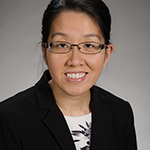 Jean Liew, MD, is a rheumatology fellow at the University of Washington School of Medicine, Seattle, where she is also pursuing a Master of Science in epidemiology under the direction of Susan Heckbert, MD, PhD, a clinical epidemiologist.
Jean Liew, MD, is a rheumatology fellow at the University of Washington School of Medicine, Seattle, where she is also pursuing a Master of Science in epidemiology under the direction of Susan Heckbert, MD, PhD, a clinical epidemiologist.
After graduating from the University of Texas Medical Branch at Galveston in 2014, Dr. Liew completed her internal medicine residency at Oregon Health & Science University, Portland, in 2017. Dr. Liew says she was inspired by one of her mentors at the university, Jennifer Barton, MD, an associate professor of medicine in the Division of Arthritis and Rheumatic Diseases, to pursue a career in clinical research.
Dr. Liew’s first project focused on co-morbid post-traumatic stress disorder in veterans with AS, which led to research on cardiovascular disease and risk factors in AS under the mentorship of Lianne Gensler, MD, director of the Ankylosing Spondylitis Clinic at the University of California, San Francisco, and co-investigator of the Prospective Study of Outcomes in Ankylosing Spondylitis cohort.
She studied the association of continuous non-steroidal anti-inflammatory drug use and the development of incident hypertension in this cohort. She will be using this cohort and population-level data to further research the association of other AS treatments with cardiovascular events, such as myocardial infarction or risk factors.
“I very much appreciate this recognition of my work in the clinical and research realm,” says Dr. Liew. “It’s gratifying to know that what I’ve been working so hard on has proven to be research that has potential.”
Dr. Liew has published papers targeting gout management in multi-morbid individuals and also mentored students, residents and junior fellows in writing case reports. Her future work will involve collaboration with experts at other universities on casual inference projects.
She is a member of the Spondyloarthritis Research and Treatment Network and the Assessment of Spondyloarthritis International Society. She has received grant funding from both organizations and is currently funded by a NIH T32 training grant through the Division of Rheumatology at the University of Washington School of Medicine.
Dr. Liew joined the ACR in 2016. “It was a fantastic opportunity to meet people who have been productive and successful in performing research, see what the field of rheumatology was all about and meet people who could potentially serve as my role models,” she says.
After completing her fellowship, she plans on continuing her clinical research and practice and pursuing an academic position.
“I wouldn’t be at this point in my career without sponsorship and strong female mentors who open doors for me,” says Dr. Liew. “Mentorships are so important. That’s what’s underlying all of my accomplishments.”
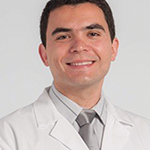 Mazen Nasrallah, MD, MSc, a graduate assistant in medicine, Division of Rheumatology, Allergy and Immunology at Massachusetts General Hospital, completed his rheumatology fellowship in 2019 at Massachusetts General Hospital.
Mazen Nasrallah, MD, MSc, a graduate assistant in medicine, Division of Rheumatology, Allergy and Immunology at Massachusetts General Hospital, completed his rheumatology fellowship in 2019 at Massachusetts General Hospital.
During his rheumatology fellowship, Dr. Nasrallah’s interests in translational medicine inspired him to join the labs of Alexandra-Chloé Villani, PhD, assistant professor, Department of Medicine, and director, MGH Single Cell Genomics Research, and Andrew Luster, MD, PhD, chief, Division of Rheumatology, Allergy and Immunology, at Massachusetts General Hospital. In this role, Dr. Nasrallah examines the clinical spectrum of inflammatory arthritis occurring as a complication of cancer immunotherapy with checkpoint inhibitors and defines the cellular and molecular perturbations that characterize these toxicities using single-cell genomic technologies.
He graduated from medical school in 2010 from the University of Jordan, Amman. The following year, he earned a master’s in immunology at King’s College London. In 2013, he completed a T32 postdoctoral research fellowship at Stanford University, Calif., where he worked on computational drug repositioning in psoriasis and the re-analysis of flow cytometry data from the RAVE clinical trial. In 2016, he completed his internal medicine residency at the Cleveland Clinic.
Since 2017, Dr. Nasrallah has served as a member of the Severe Immunotherapy Complications Steering Committee at Massachusetts General Hospital and has also been involved in educating patients suffering from immunotherapy complications through patient advocacy, meeting presentations and patient educational material. He participated in the musculoskeletal examination teaching session for first-year Harvard Medical School students and rheumatology ambulatory teaching sessions for junior and senior residents in internal medicine at Massachusetts General Hospital.
Meanwhile, he is breaking ground in a new rheumatology field. He’s researching why lifesaving cancer treatments are causing some cancer patients to develop inflammatory arthritis and other rheumatic complications.
“So far, a small community of rheumatologists is studying these patients,” says Dr. Nasrallah, also an instructor in medicine at Harvard Medical School. “While it’s a great honor to be recognized by the ACR for my work during my fellowship, this award could help me connect with other researchers in this area.”
Dr. Nasrallah’s academic knowledge has grabbed attention in other ways. In 2017, his team won the Knowledge Bowl competition and captured second place last year. He was awarded the 2019 Rheumatology Research Foundation Scientist Development Award to pursue clinical and translational research in the Rheumatic Complications of Immunotherapy.
“This award is a validation of my research efforts and education,” he says. “It also means that I did a good job during my fellowship and made my mentors happy.”
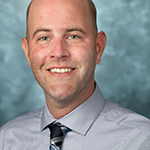 In June, Brian Nolan, MD, finished his fellowship in pediatric rheumatology at Children’s Hospital of Philadelphia. Now an attending physician in the Division of Rheumatology at Ann & Robert H. Lurie Children’s Hospital of Chicago, he credits his exposure to immunology research as a laboratory technician from 2005–08 at Massachusetts General Hospital as the catalyst for his interest in rheumatology.
In June, Brian Nolan, MD, finished his fellowship in pediatric rheumatology at Children’s Hospital of Philadelphia. Now an attending physician in the Division of Rheumatology at Ann & Robert H. Lurie Children’s Hospital of Chicago, he credits his exposure to immunology research as a laboratory technician from 2005–08 at Massachusetts General Hospital as the catalyst for his interest in rheumatology.
During his fellowship, Dr. Nolan conducted two years of basic science research under the mentorship of Neil Romberg, MD, assistant professor of pediatrics, Division of Immunology, Children’s Hospital of Philadelphia. Dr. Nolan’s main project was the immunologic and mechanistic characterization of a novel form of congenital B cell deficiency due to mutations in a transcription factor found in multiple unrelated patients. This work was selected for presentation at a Pediatrics Grand Rounds in May 2019. A manuscript is in development.
During this time, he worked with his co-fellows and research staff in the Division of Rheumatology to design and implement a quality improvement project with the goal of optimizing study recruitment from the outpatient clinic. While training at Children’s Hospital of Philadelphia, he developed a strong interest in autoinflammatory disease, syndromes of immune dysregulation and the emerging role of personalized medicine in pediatric rheumatology. He hopes to identify new opportunities for translational research through his work with the program in inflammation, immunity and the microbiome at Lurie Children’s Hospital.
Before graduating in 2013 from the Cleveland Clinic Lerner College of Medicine at Case Western Reserve University School of Medicine, he was awarded a Doris Duke Foundation Clinical Research Fellowship. While studying under the mentorship of Raphael Hirsch, MD, who then chaired the Division of Pediatric Rheumatology at Children’s Hospital of Pittsburgh, Dr. Nolan conducted an imaging study in patients with polyarticular juvenile idiopathic arthritis, which he presented as his medical school thesis.
In 2016, Dr. Nolan completed his residency in pediatrics at Children’s National Hospital, Washington, D.C., and joined the ACR as a fellow in training. He is also a member of the Childhood Arthritis and Rheumatology Research Alliance and Clinical Immunology Society.
“I’m honored by this award, which validates the effort I put into fellowship training both in research and patient care,” says Dr. Nolan, also an assistant professor of pediatrics at Northwestern University Feinberg School of Medicine, Chicago. “It motivates me to try to develop innovative treatment approaches for children with rheumatologic or autoinflammatory diseases.”
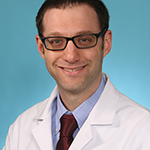 Michael A. Paley, MD, PhD, completed his residency and a rheumatology fellowship at the Washington University School of Medicine, St. Louis, where he received the Gregory J. Gurtner Internal Medicine Residency Research Award in 2015 and the Knowlton Incentive for Excellence Award in 2017.
Michael A. Paley, MD, PhD, completed his residency and a rheumatology fellowship at the Washington University School of Medicine, St. Louis, where he received the Gregory J. Gurtner Internal Medicine Residency Research Award in 2015 and the Knowlton Incentive for Excellence Award in 2017.
An instructor of medicine at Washington University School of Medicine, he blends his clinical and scientific training to identify basic mechanisms of ocular manifestations of rheumatologic disorders. By studying ocular disease, he hopes to provide a unique window into better understanding systemic inflammatory processes.
Dr. Paley obtained his MD and PhD in 2014 from the Perelman School of Medicine at the University of Pennsylvania, Philadelphia. While being mentored in graduate school by E. John Wherry, PhD, chair, Department of Systems Pharmacology and Translational Therapeutics, and Steve Reiner, MD, now the Charles H. Revson Professor of Microbiology & Immunology and Pediatrics and director of the Medical Scientist Training Program at Columbia University, New York, he discovered a passion for studying persistent inflammation after identifying key transcription factors that sustain chronic T cell responses.
In his postdoctoral work with Wayne Yokoyama, MD, the Sam J. and Audrey Loew Levin Professor of Medicine, Pathology and Immunology and director of the Medical Scientist Training Program at Washington University School of Medicine, Dr. Paley developed a biorepository for ocular and blood specimens of patients with uveitis to determine pathogenic cells present within the eye and their peripheral blood correlates.
In his clinical time, he works in a multidisciplinary clinic, in concert with ophthalmologists and his clinical mentor—Richard Brasington Jr., MD, professor of medicine at Washington University School of Medicine—to treat severe or refractory inflammatory eye disease. Together, with members of the Division of Rheumatology and Department of Ophthalmology, Dr. Paley leveraged this experience to design and implement an investigator-initiated pilot study for the treatment of infectious uveitis.
“I certainly would not be where I am today without a series of exceptional mentors,” he says.
Dr. Paley joined the ACR in 2016 and has attended several ACR/ARP Annual Meetings. Doing so helps keep him updated on cutting edge developments in the field and has enabled him to network with other physicians and role models.
“Their support and wisdom are irreplaceable,” says Dr. Paley. “To be able to pick their brain and be counted in that group of people is amazing. I’m deeply honored to receive this award.”
Meanwhile, Dr. Paley continues to develop his expertise in ocular inflammation within the rheumatology space. In the years ahead, he hopes to be a blended physician-scientist teaching trainees, running a research lab and treating patients. Through the ACR’s educational, mentoring and networking opportunities, he is optimistic about reaching his goal.
“This isn’t exactly an easy path,” he says. “But as I meet more physicians and scientists who generously decide to mentor folks like me, I hope to make a positive impact in our field and pay it forward.”
 Natalie Rosenwasser, MD, now an assistant professor at Seattle Children’s, joined the Hospital for Special Surgery, New York, in 2016 to pursue a fellowship in pediatric rheumatology, which she completed in June. She wasn’t even aware of the ACR until she attended an Annual Meeting as a first-year fellow. She says, “That’s when I realized there’s an international group dedicated to potentiating rheumatology.”
Natalie Rosenwasser, MD, now an assistant professor at Seattle Children’s, joined the Hospital for Special Surgery, New York, in 2016 to pursue a fellowship in pediatric rheumatology, which she completed in June. She wasn’t even aware of the ACR until she attended an Annual Meeting as a first-year fellow. She says, “That’s when I realized there’s an international group dedicated to potentiating rheumatology.”
In 2013, Dr. Rosenwasser graduated from St. George’s University School of Medicine, Grenada, West Indies, and completed her pediatrics residency in 2016 at Stony Brook Children’s Hospital, N.Y.
For the past two years, Dr. Rosenwasser has worked under the mentorship of Virginia Pascual, MD, founding director of the Gale and Ira Drukier Institute for Children’s Health at Weill Cornell Medicine, New York. Together, they investigated an unmet need in the field—the identification of urinary biomarkers to help diagnose, classify and follow lupus nephritis in children.
Dr. Rosenwasser made significant contributions to the study design, wrote and obtained Institutional Review Board approval and collected clinical samples from patients and controls. Although the lab had a long track record of profiling the blood transcriptome of children with inflammatory diseases, it had never before attempted to profile urine samples. Her initial results demonstrated that cell-associated transcripts can be detected in urine of patients with SLE with and without overt nephritis, but not in healthy controls. In subsequent studies, including longitudinal samples, her work revealed that urinary transcripts reflect the activity of inflammatory pathways known to be dysregulated in lupus plus additional ones that are less evident when using blood samples. Some of these transcripts appear associated with specific classes of lupus nephritis and disease activity. So far, results show the feasibility of this approach and open the door for non-invasive biomarker development and therapeutic target identification in lupus nephritis and perhaps inflammatory nephropathies beyond lupus.
Dr. Rosenwasser teamed up with statisticians and bioinformaticians to query the data and visually display it. This work has now been presented at the 2019 Childhood Arthritis and Rheumatology Research Alliance (CARRA) meeting, where she obtained the CARRA Hope Award for Basic Science, and was accepted for presentation at the Fall 2019 Immunology Symposium at Cornell University, Ithaca, N.Y., EULAR/PReS 2019 and the 2019 Fellow Research Meeting for the Hospital for Special Surgery.
Dr. Rosenwasser also received a CARRA-Arthritis Foundation 2019 PReS/EULAR Travel Award and secured funding for her research through a CARRA Fellow Small Grant from the Arthritis Foundation and CARRA.
Carol Patton is a freelance writer based in Las Vegas.
Masters Reunited
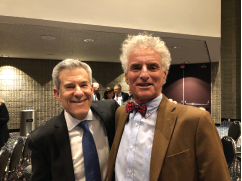 ATLANTA—During the 2019 ACR/ARP Annual Meeting, the immediate past physician editor of The Rheumatologist (TR), Simon Helfgott, MD, was honored by the ACR with the Master designation, along with 22 other outstanding individuals (see Part 1 of this series in the November issue). Dr. Helfgott shared this photo from the event with TR, saying:
ATLANTA—During the 2019 ACR/ARP Annual Meeting, the immediate past physician editor of The Rheumatologist (TR), Simon Helfgott, MD, was honored by the ACR with the Master designation, along with 22 other outstanding individuals (see Part 1 of this series in the November issue). Dr. Helfgott shared this photo from the event with TR, saying:
Ron Laxer and I were fortunate to have been selected as Masters this year. The side story is that we have been great buddies for 52 years, starting in high school. We went to college together and then medical school. We parted ways when Ron chose pediatrics and I went into internal medicine, but later, we bonded over our love of rheumatology. It was really neat that we shared the stage yesterday [Nov. 9].
Left: Ronald M. Laxer, MD, professor of pediatrics & medicine, Division of Rheumatology, University of Toronto; The Hospital for Sick Children, Toronto, Ontario, Canada. Right: Simon Helfgott, MD, director of education & fellowship training, Division of Rheumatology & Inflammation, Brigham & Women’s Hospital; associate professor of medicine, Harvard Medical School, Boston.



